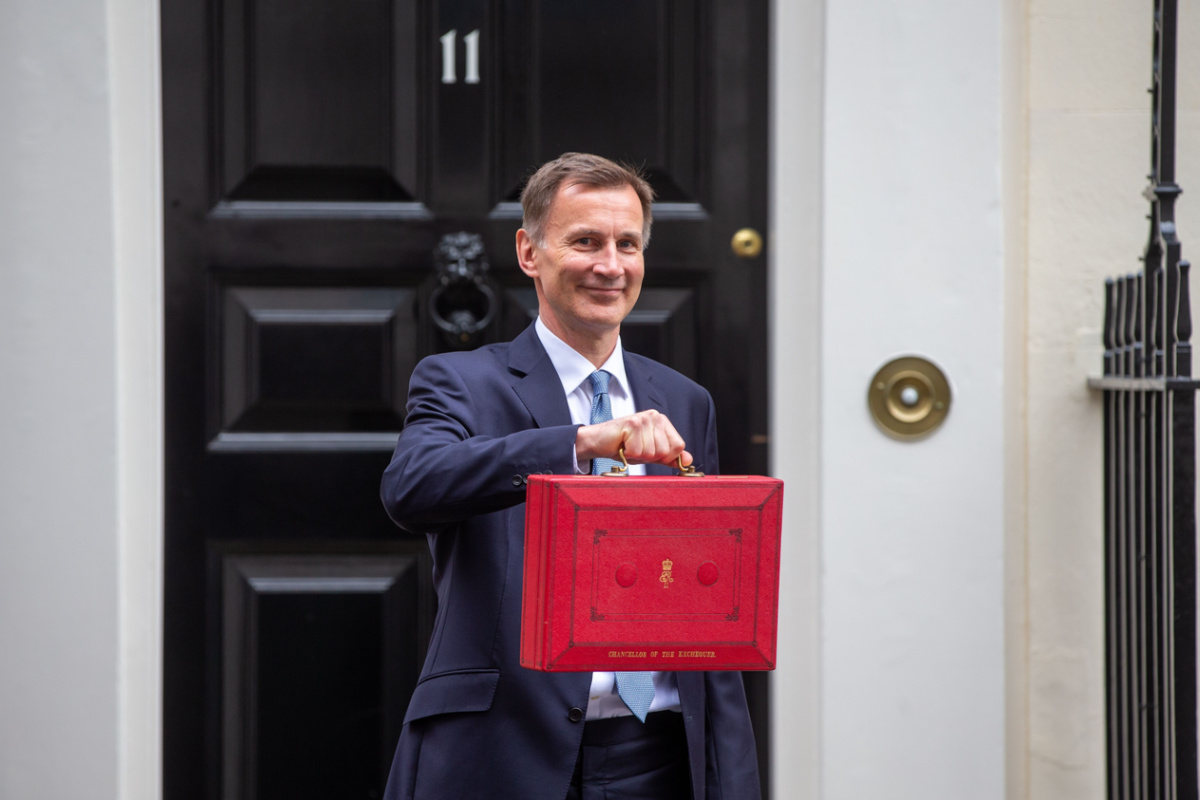LIVE: Autumn Statement
13.38
Falling short
Mohsin Rashid, CEO of ZIPZERO, said: “All the National Insurance cuts in the world will still fall short of rebuilding the pile of rubble that millions of Britons’ finances have been left in after years of fiscal chaos.

Group Editor of Shard Financial Media, which encompasses the Credit Strategy, Reward Strategy, TRI and FSE brands.
He continued, “Hunt’s priorities are understandable – he has to paint a picture of long-term economic prosperity – but his focus was also misguided. It’s all very well for him to pat himself on the back for introducing policies that will put more money in people’s pockets in the long-term, and may eventually contribute to restoring economic stability (providing of course that they don’t spike inflation). But where is the relief that is so sorely needed by those still struggling to put clothes on their backs and food on the table?
“The cost-of-living crisis is far from over – bolstering immediate, short-term support like energy bill relief and cost-of-living payments was crucial but did not materialise. Meanwhile, it is plain to see that these cuts predominantly benefit those whose pockets are already well-lined. Time and time again, the people who truly need support – lower income households – are left to fend for themselves by Hunt’s wanting fiscal policies, while he turns a blind eye in the name of ‘growth’."
13.30
Businesses celebrate
Toby Ryland, Corporate Tax Partner at accountancy firm HW Fisher said: “Full Expensing is a straightforward and easy tax relief that will make the decision to invest in new equipment much easier. It covers a wide variety of business necessities, from IT infrastructure, office furniture, certain commercial vehicles, warehouse and construction equipment, and fixtures for non-residential properties.
"It means that tax deductions will follow the financial cost of investing in real time rather than spreading the cost over a longer period. It’s simple to administer too - companies can claim the relief through their Corporation Tax return.
“For example, if a business spends £100 on new tools and machinery, it will get a tax deduction for the full £100 immediately. Prior to the Full Expensing rules, the company would need to have claimed capital allowances on the £100, and while they would have still got the full tax relief, it would be over a much longer period of time, in this case, at a rate of 18% per year.
“Arguably a tactical and political decision ahead of 2024 elections, but a positive announcement nonetheless from the Chancellor. This will help to bolster UK business and bring back British entrepreneurial spirit. This is a step in the right direction to put the UK back on the map as a go-to destination to do business in.”
13.26
Tax cut
Employment tax NI rate cut to 10%, down from 12%, to be brought in from 6 January.
13.23
Low pay
National living age increases - to £11.44 per hour. Real take home after tax pay will increase by 35%.
13:17
Expensing
Full expensing tax break has been abolished permanently
13:10
SMEs
Freeze all business multiplier for a further year. And will extend the 75% business rates for retail sector.
Self employed - major reform of the Class 2 National Insurance is now abolished all together. Saving £192 a year. Class 4 national insurance also slashed to 8%.
12:59
Housing
Investing £32million to help planning backlog, £450million to the local housing fund, and any house can be converted into two flats as long as exterior remains unchanged
12.54
Growth
Economy has grown father than Euro area, now 1.8% larger than pre-pandemic. Expected to grown 0.7% next year and 1.4% in 2025
12.49
Governement debt
National debt is now 94% of GDP, second lowest in the G7
On track to bring borrowing down, every year of the forecast.
12.47
Cost of living crisis
Increase universal credit and other benefits increase of 6.7% from April next year £470 a year for 5.5million households
Rent - Local Housing allowance to increase to the 30th percentile
Taxes on alcohol - All duty on alcohol is frozen
Pensions: Honour commitment to triple lock, increase full state pension by 8.5% worth up to £900 more a year
12:41
OBR forecast
Inflation was 11.1% when the when the Chancellor took office, it now sits at 4.6 and will go 2.8% by the end of 2024.
12:39
How many??
The Chancellor says he will launch 110 measures to help grow the economy
12:38
Set the scene
The Chancellor sets the scene of halved inflation, and GDP growing rather than shrinking after the pandemic and energy crisis.
Says by not borrowing the full amount expected has kept inflation down.
12:06
Intervention on late payments
Oliver Prill, CEO at Tide, said: “Small businesses need the Chancellor to prioritise intervention on late payment laws. Late payments are stifling the cash-flow of small businesses across the UK, causing entrepreneurs to have sleepless nights and preventing them from investing in and growing their businesses. Ultimately, it can be the difference between thriving and failing.
“It’s estimated that 50,000 businesses a year fail because they are paid late, and by the government’s own estimates eradicating late payments could boost the economy by £2.5bn annually.
“Some of these issues are expected to be in the forthcoming Prompt Payment and Cash Flow Review which we welcome. But small businesses need action now.
“The smallest businesses are already facing a perfect storm of increasing costs, higher interest rates and wage inflation. For those with business premises, ending the current rate relief and the resulting hike in business rates will push them over the edge and add to the already increasing insolvency numbers (now at their highest levels since 2009 and at over 18,300 in the year to September).
“We urge the Chancellor to extend the rates relief and increase their chances of survival. An increase in the threshold at which small businesses start paying business rates would also be a real boost for the smallest of firms.”
11:34
No victory yet
Alastair Douglas, CEO of TotallyMoney commented: “In the past two years, record levels of inflation have driven up the cost of a pint of milk by 44%, while the government froze the personal tax allowance at £12,570. This has meant that as businesses provided staff with the financial support the government didn’t, wage rises walked millions of workers into paying more tax — a majority of whom were already some of the UK’s lowest earners
“And although the government is claiming victory in the fight against the cost of living, households up and down the country are unlikely to agree when on Thursday morning, Ofgem tells us to prepare for another energy price hike this January.
“So while these so-called tax cuts might make the headlines, they won’t be doing much to heat struggling households, or fill empty stomachs this Christmas. Jeremy Hunt may have claimed the economy has ‘turned a very big corner’ — but is the government really just going round the houses?”
11.28
Change in narative
Evelyn Partners’ Head of Tax Sian Steele notes that the narrative has changed over recent weeks and days as the prognosis on the public finances has improved and the latest ONS data has shown inflation retreating to 4.6%:
“The Office for Budget Responsibility presented the Chancellor on Friday evening with finalised public finance forecasts, and the speculation is that the fiscal headroom might have expanded to as much as £25billion. Unconfirmed reports have suggested that an income tax or national insurance cut could now be on the table, and Mr Hunt said nothing in interviews over the weekend to rule out that possibility.
“One effect of such a big-ticket move on direct taxation of income could be that more targeted moves like a reduction in inheritance tax for instance might be shunted into the sidings until the Spring Budget or the Conservatives’ election manifesto.
“To announce cuts to a wealth tax as well as income taxes would be something of a handbrake turn from the Chancellor, and – to mix metaphors - the hat is probably not big enough for such a large rabbit. Mr Hunt’s newly bullish emphasis on growth as well as inflation does suggest both households and businesses can expect some tangible tax reductions on Wednesday.”
11.24
Bonds drop
Ahead of the Autumn Statement, bond markets have been unstable as investors anticipate potential tax cuts to be unveiled by the Chancellor. Yields on 10-year gilts climbed as high as 4.14% in early trading, up from 4.09% at the start of the day. These yields represent returns that the Government promises to bond buyers. After peaking at 4.67% in mid-October, yields had declined based on hopes of interest rate cuts following improved economic signals like October’s inflation drop to 4.6%. However, uncertainty surrounding the Chancellor’s forthcoming tax reduction plans has paused this yield descent. Market volatility reflects investor uncertainty regarding the tax and spending outlook. The Autumn Statement promises fiscal changes, but the extent remains unclear. Markets are wavering as they await greater policy insight.
11.17
What to expect
Given the Chancellor’s focus on fiscal prudence, we should expect only minor adjustments in policy in the Autumn Statement. Potential measures include cuts to inheritance tax, additional housing support, and making permanent the full expensing of capital expenditures rule. The Chancellor’s political "surprise" could be a small one-time cost of living payment for vulnerable households this winter, helping offset reductions in other benefit spending. This would aid families facing rising energy bills, aligning with the Chancellor’s emphasis on disciplined finances. Though likely modest, these measures could fine-tune relief where most needed while avoiding fiscal recklessness. The details remain uncertain, but we anticipate cautious support for sectors under strain rather than sweeping stimulus.
10:46
Employment support launched for over a million people
New Back to Work Plan to help up to 1,100,000 people with long-term health conditions, disabilities or long-term unemployment to look for and stay in work.
The Chancellor Jeremy Hunt and the Secretary of State for Work and Pensions Mel Stride have unveiled their Back to Work Plan – a package of employment focused support that will help people stay healthy, get off benefits and move into work – as part of the Autumn Statement.
Building on the ambitious £7 billion employment package from Spring Budget the Chancellor is using his Autumn Statement to outline a new Back to Work Plan, which will expand the employment support and treatment available and reform the ways that people with disabilities or health conditions interact with the state.
Getting more people into work and ensuring work pays remains a key priority for the government. It is important for growing the UK economy, managing inflation, controlling spending, and improving living standards. Getting more people into good jobs is also good for those individuals and the best route out of poverty.
10:32
British manufacturing to boost economic growth
The government has today announced £4.5 billion in funding for British manufacturing to increase investment in eight sectors across the UK. The funding will be available from 2025 for five years, providing industry with longer term certainty about their investments.
Stay up-to-date with the latest articles from the Credit Strategy team
Get the latest industry news





